


6 Fun Ways to Teach and Build Important Social Skills for Kids

There's a saying that all you really need to know, you learned in kindergarten: how to share, take turns, listen and follow directions for starters. These positive attributes, also known as social skills, are just as important as learning your ABCs and 123s.
Many parents might not realise that these soft skills need to be explicitly taught, in the same way that we teach our children how to read, count and write.
what-are-social-skills-jump-link
What are social skills?
Social skills are the soft skills that children need to interact with their peers and adult figures on a daily basis. These skills enable children to navigate social situations with ease, providing a framework for many scenarios they may encounter in the future.
Teaching your child social skills is a marathon, not a sprint. Some skills will come easier than others, and it takes repetition over time to build these foundational skills.
We've compiled a list of some of the most important social skills to work on with your child.
Have fun with them and find your own way to adapt the list and make it enjoyable for you and your children – you've got this!
important-social-skills-jump-link
8 important social skills every child should learn
1. Sharing
Sharing, whether we want to do it or not, is something we do every day. We share our roads, public transportation, the footpath, our lunchrooms and more. However, it's not something that comes to children naturally. Sharing needs to be practised over and over again.
There are many different scenarios in which sharing applies, and children won't understand all of them right away.
At the heart of it, they need to learn that they're not the only one with needs and wants, and that resources need to be shared in order for everyone to co-exist peacefully. A shared cookie from a friend never hurts!
As they mature and they start to understand the world from other people's perspectives, this will be a much easier concept to digest. Until then it's practice, practice, practice!
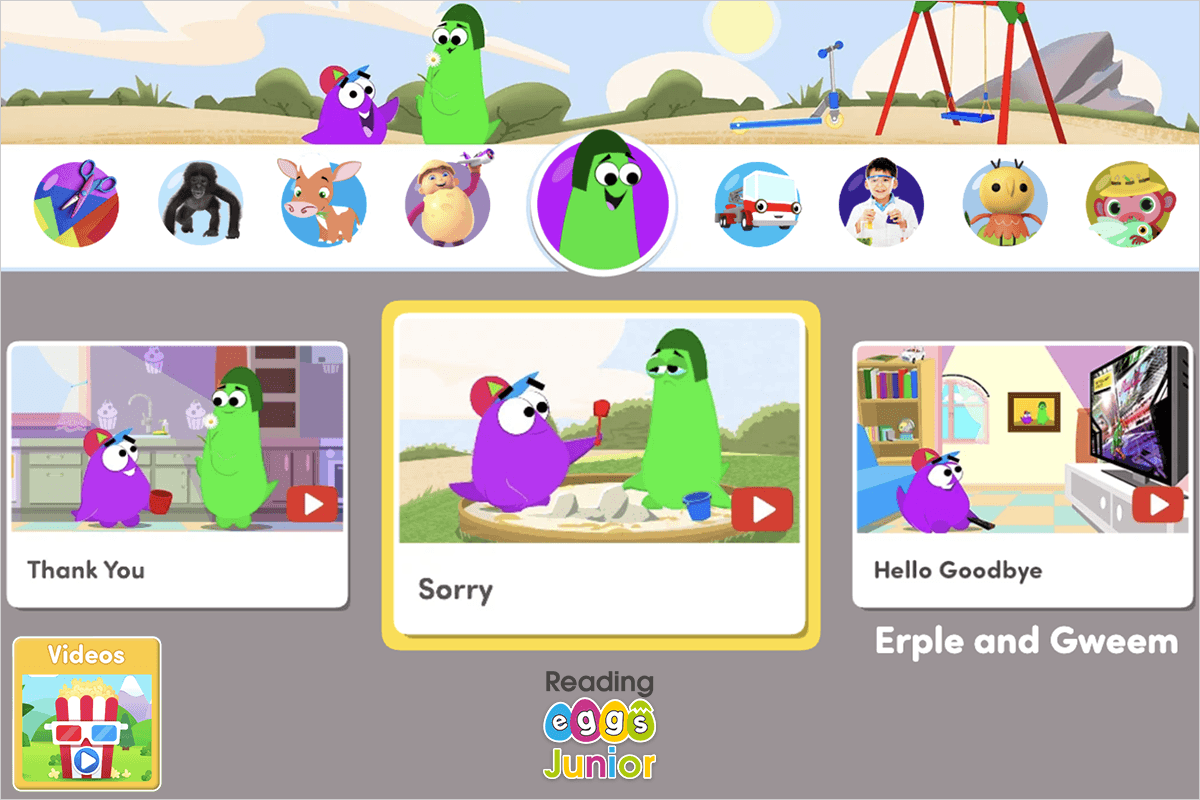
The Erple and Gweem video series in ABC Reading Eggs Junior (ages 2–4) models good social skills for children through humorous, everyday scenarios. Get access to the series (and more!) free for 30 days with a free trial of ABC Reading Eggs.
2. Listening
Listening is crucial. But it's not just merely listening, we want to teach our children active listening. When they practise active listening, they can begin to decode information, respond intelligently and build stronger relationships with their peers.
Discover eight everyday listening activities to help build your child's listening skills.
3. Following directions
Learning to follow directions is a key part of the learning process, providing a clear way to go about learning new skills and ensuring they're done correctly.
Directions help children get to their goals, whether it's completing a worksheet, participating in a game with friends or figuring out how to act in different environments.
For example, we learn to lower our voices and talk less in the library versus understanding it's ok to speak and laugh loudly in the playground.
Start with one direction at a time and build up to multi-step directions as your child gets the hang of it. You might start with, “go get your shoes”, and then expand to, “go get your shoes and put them on”.
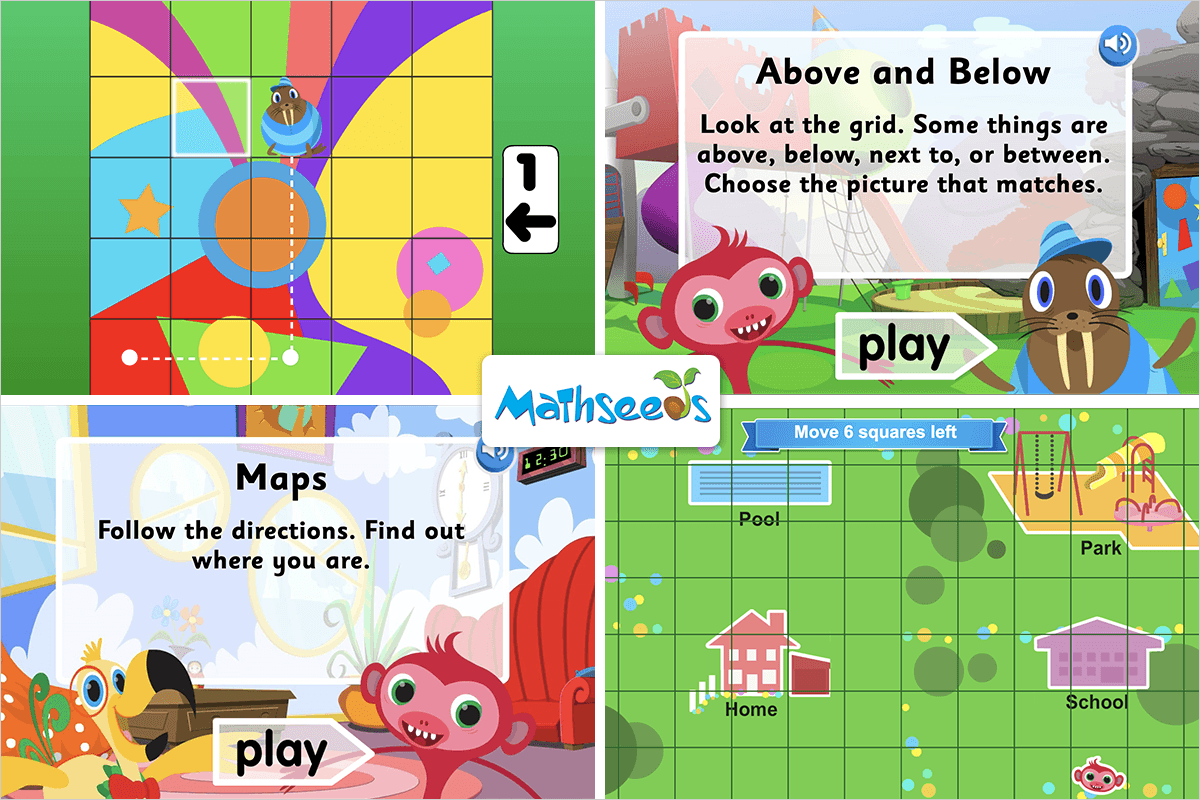
ABC Mathseeds (for ages 3–9) teaches children how to follow directions through fun and interactive online lessons. Get access to the full online maths program free for 30 days with a free trial of ABC Reading Eggs.
4. Collaboration and cooperation
Practising collaboration and cooperation early and often is important in developing these key skills. However, this can be a harder concept for younger children to digest as they're not always emotionally mature enough to put these skills into practice.
Plant the seed early and encourage lots of practice working with other children – and adults too!
The more children learn to collaborate, the stronger their relationships will become, helping to feed this positive cycle.

The Trucks video series in ABC Reading Eggs Junior promotes cooperation skills, teamwork and problem-solving. Free trial
5. Patience
Patience is a skill that many adults are still actively working on as well. With improved patience comes the ability to slow down and take in ideas from other perspectives, increased empathy and stronger social bonds.
Practising this trait can be more fun than it sounds, as many games involve turn taking.
This gives parents a subtle way to teach patience, as it can sometimes be easier for your child to follow the rules of the game, rather than listening to you directly – got to love kids, right?!
6. Empathy
Empathy is the ability to put yourself in someone else's shoes. It makes for better communication, relationships and understanding, which leads to less conflict and misunderstanding.
One of the best ways to teach empathy is to model it for your children. This involves listening to what they're saying, validating their emotions and responding with kindness.
While challenging during difficult moments, empathy is a skill that children learn better through example than explanation.
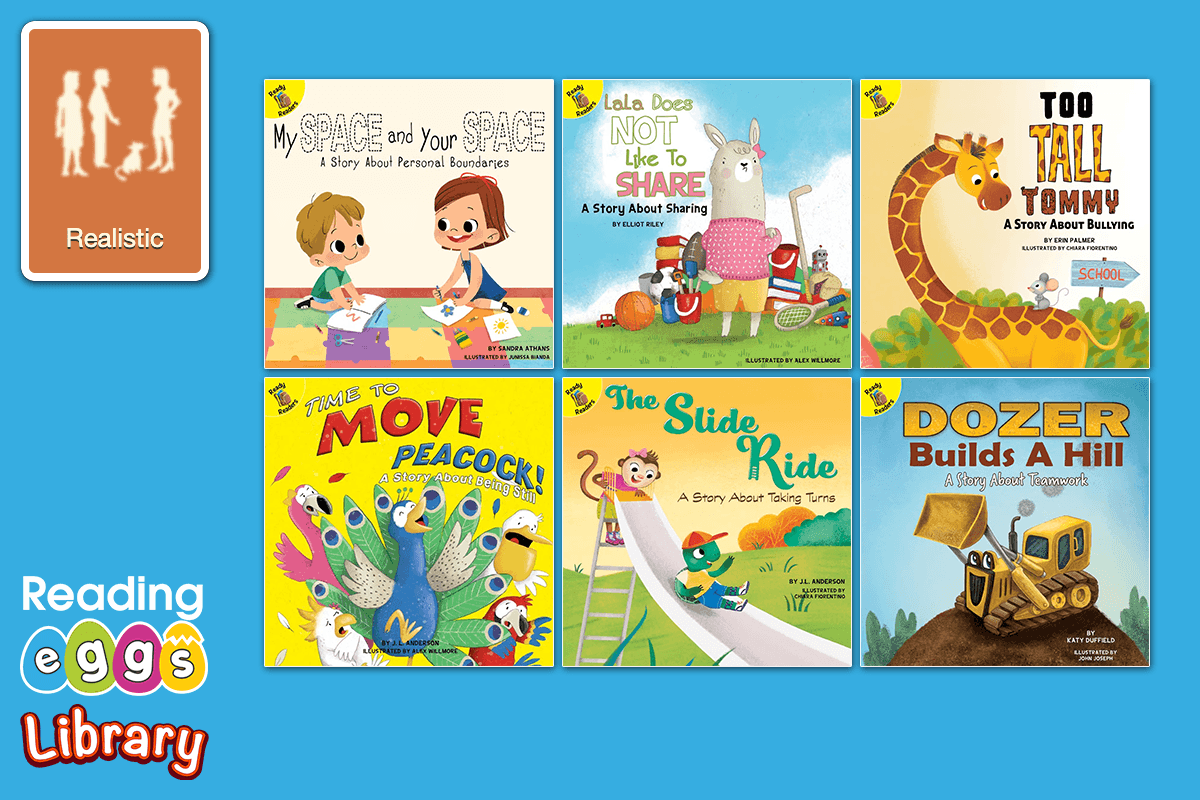
The ABC Reading Eggs Library of over 4,000 books has many titles about social skills, including this series for reading age 6: My Space and Your Space (about personal boundaries), Lala Does Not Like to Share (about sharing), Too Tall Tommy (about bullying), Time to Move Peacock (about being still), The Slide Ride (about taking turns) and Dozer Builds a Hill (about teamwork). Get access to the series (and all 4,000+ books) free for 30 days. Free trial
7. Respecting boundaries
Whether your child realises it or not, they are practising boundaries all the time. A request to stop being tickled, a simple “no”, or even stepping away from a situation they don't like, are great examples.
It's important to acknowledge these boundaries (when safe and appropriate), so you can model how to react when a boundary has been set.
8. Positivity
Remaining positive and fostering a positive spirit is crucial to all of our social interactions. The more positivity we bring to an interaction, the more positive energy we will get out of it.
Fostering a positive spirit also helps your child to be more open to feedback and recover from mistakes faster. If they're able to see a setback as a learning experience rather than a failure, they’ll be on their way to developing a growth mindset.
Ready to build your child's social skills AND reading confidence?
ABC Reading Eggs (for ages 2–13) combines award-winning literacy instruction with features that support social-emotional learning in meaningful ways. The lessons and rewards system build confidence and teach patience as children progress through the maps. The extensive online library of over 4,000 books includes engaging stories about friendship, empathy and cooperation. Plus, ABC Reading Eggs Junior has videos and picture books for ages 2–4. Join over 20 million families worldwide who've discovered how ABC Reading Eggs transforms children into confident, enthusiastic readers. Start your FREE 30-day trial today!
struggle-with-social-skills-jump-link
Reasons why your child might struggle with social skills
Autism and social skills
While children will vary in terms of how quickly they pick up on these skills, some children will inherently need more support than others.
Children on the autism spectrum are known to struggle with picking up on social cues and may take a bit longer to learn these concepts.
Additional practice at home, in the classroom and within a therapy setting is helpful, as well as an understanding that these children will need a bespoke approach and plenty of breaks to avoid cognitive overload.
It's equally important not to push your child and to follow their lead when they show signs of discomfort and/or overwhelm.
Thankfully there are many proven ways to support autistic children, including:
Social stories: Social stories provide helpful visuals and a first-person narrative that is clear and direct. It's something you can easily make at home, using photos of your child along with the people and places they'll encounter.
Social skills groups: Many families find social skills groups useful, as they provide a space for autistic children to meet and receive expert support while they practise these life-long skills.
Role-playing: Acting out a situation directly or using toys is a low-pressure way to teach social skills and encourage learning through play.
Video modelling: As many autistic children are visual learners, watching videos of common social interactions is a great way to learn these key concepts.
The Reggie & Friends video series in ABC Reading Eggs Junior (for ages 2–4) models good social skills, promotes empathy and emotional development through stories of everyday life. Young Reggie and his friends play games, go to the park, ride bikes, bake a cake and visit a farm. Get access to the series (and more!) free for 30 days with a free trial of ABC Reading Eggs or watch it on YouTube below.
teach-kids-social-skills-jump-link
How to teach kids social skills
Now that you know what social skills are, let's talk about how to teach them. Read below for practical tips and strategies for parents and educators alike.
1. Model, model, model!
Modelling how to do something versus just telling your children how to do it is one of the most effective ways to teach them.
Show them the behaviour you want to see by simply modelling it in your everyday interactions with your children.
That means actively listening, setting and respecting boundaries and extending empathy.
You don't need to be perfect (none of us are!) but practising consistently will help those big lessons sink in over time.
2. Practise empathy
Talking through your feelings is a great way to show your child how to extend empathy.
While this may not come naturally, try to think of it as simply naming the feeling, “I'm feeling a bit sad”, and normalising it, “but that's ok”.
You can also help your child verbalise their feelings in a similar way. For example, if you can see they are mad, a simple, “I can see you’re feeling a bit mad and that's ok” is a great way to acknowledge it.
Your child will see that it's ok to feel the way they do and learn how to support others when they're experiencing big feelings.
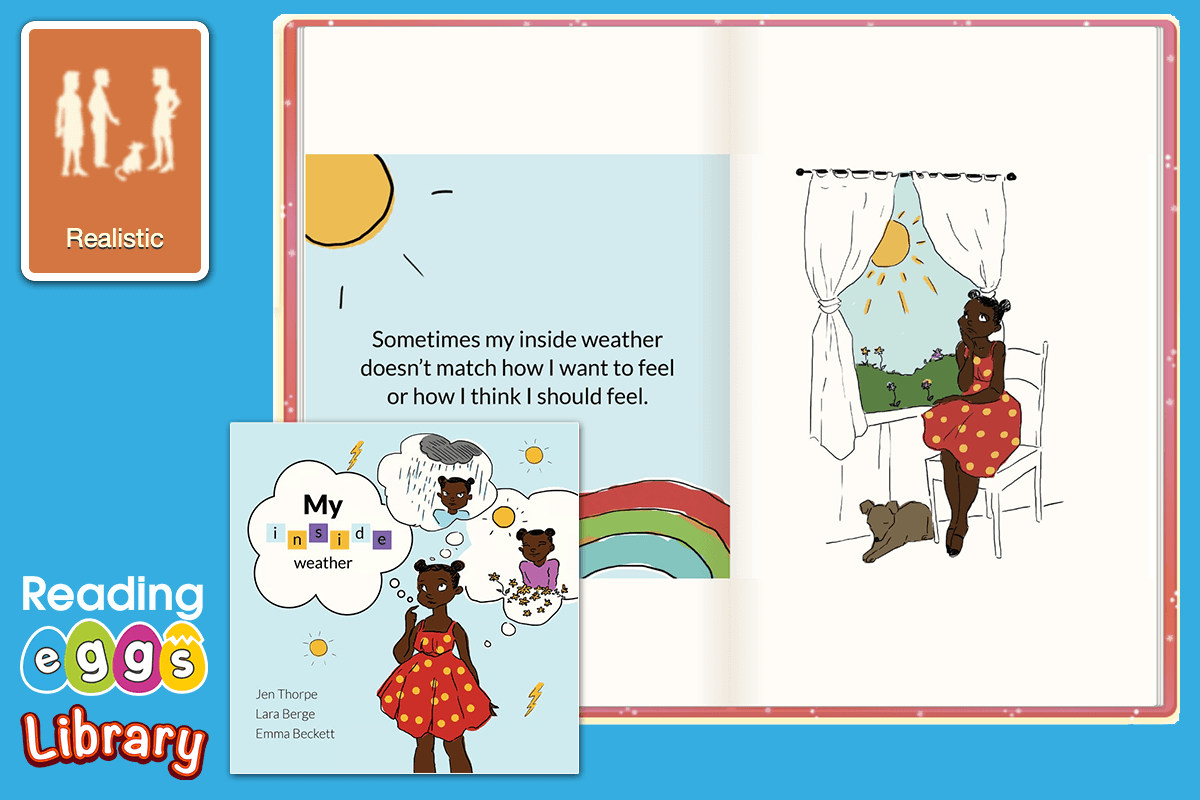
Sometimes our feelings are hard to talk about, but everyone knows how to talk about the weather. My Inside Weather is a beautifully illustrated book that helps children understand and express emotions by comparing feelings to different types of weather. Get access to the book (and all 4,000+ titles in the ABC Reading Eggs Library) free for 30 days. Free trial
3. Make it safe to fail
If we tell our children that mistakes are a part of the process rather than something to fear, it helps to normalise slip-ups. They need to know that we don't expect perfection every time and that failure is just part of the learning process.
Your new mantra: fail, learn, repeat!
4. Encourage sharing but don't force it
While sharing is important, it's also key to recognise when your child isn't ready to share certain things, like a special stuffed animal or blanket.
Forcing them will only create a negative association, so it's best to respect their boundaries, which in turn will teach them how to respect yours as well.
5. Know your child's limits
Each child has their own capacity for socialising, so it's important to know when your child has reached their limit and not to force social interactions if they are showing signs of fatigue.
6. Make it fun
Last but not least, make it fun! Find activities your child loves – whether it be arts and crafts, sports or coding – and use those as opportunities to hone their social skills.
Games you can play at home that are silly and light-hearted (think Simon Says) are also a great way to make learning social skills fun and entertaining.
Ready to build your child's social skills AND reading confidence?
ABC Reading Eggs (for ages 2–13) combines award-winning literacy instruction with features that support social-emotional learning in meaningful ways. The lessons and rewards system build confidence and teach patience as children progress through the maps. The extensive online library of over 4,000 books includes engaging stories about friendship, empathy and cooperation. Plus, ABC Reading Eggs Junior has videos and picture books for ages 2–4. Join over 20 million families worldwide who've discovered how ABC Reading Eggs transforms children into confident, enthusiastic readers. Start your FREE 30-day trial today!
Social skills activities and games for kids
There are many fun and engaging activities and games that can help your child build their social skills.
Pretend play
Pretend play is a safe space to explore new ideas and become familiar with situations that may seem foreign to young children.
Through pretend play, your child can be silly and say and do things that they perhaps wouldn't if they were being themselves (as opposed to Floppy the bunny, for example). It takes the pressure off your child and provides a gentle way to correct mistakes because it’s much sillier and light-hearted when Floppy forgets his manners.
Discover more benefits of pretend play.
Reading
Reading is a wonderful way to develop empathy, as when children read, they can view things from the character's point of view and understand why they think and feel in particular ways. It gives them a unique insight into someone else's perspective and broadens their views beyond their own.
Biographies written for children about people from different cultures, time periods and circumstances can expose young minds to varied life experiences. Children often find these true stories of real people who overcame adversity more emotionally powerful than fiction.
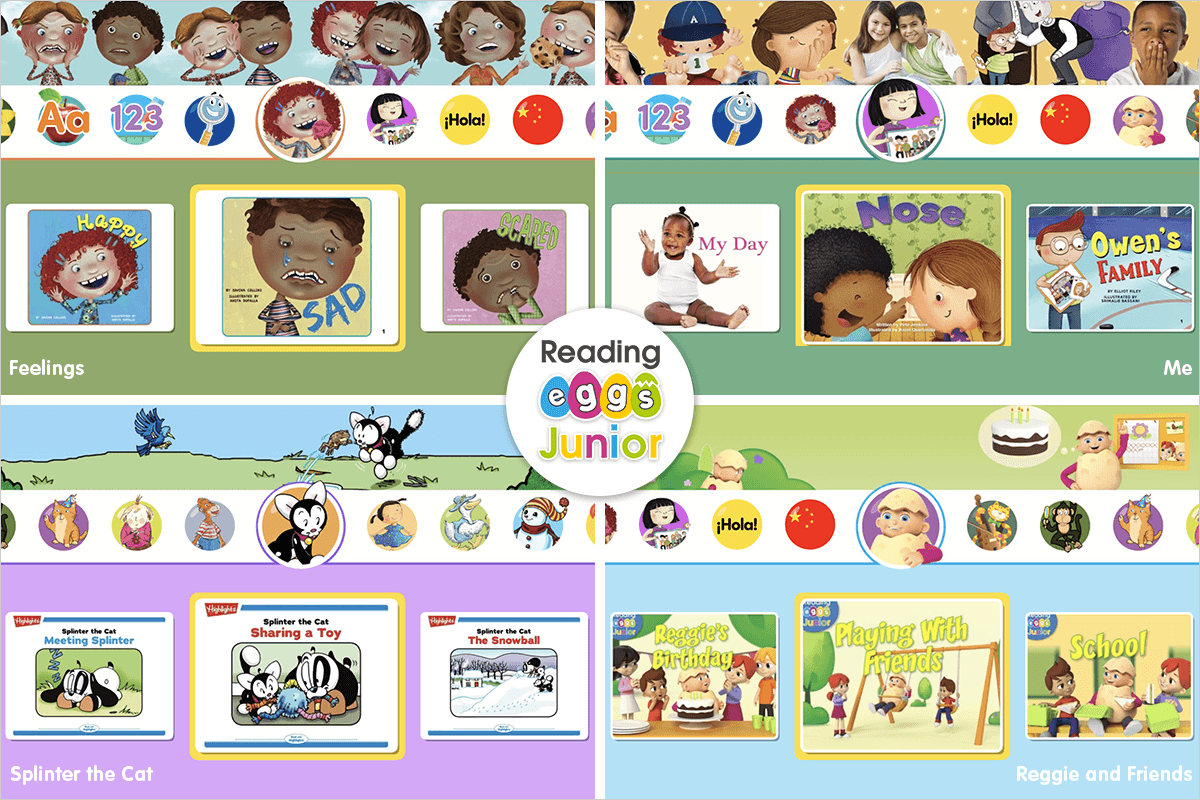
ABC Reading Eggs Junior has a wide range of books that teaches toddlers and children social skills and promotes emotional development. Free trial
Social Stories
As mentioned above, social stories provide a powerful way to show your child exactly what they'll experience in a variety of social situations.
This can be easily done at home using photos of your child along with the people and places they'll encounter.
You can even turn this into a DIY activity with your child – ask them to help take photos, print and cut them out and let them help you construct the narrative.
Games
Simon Says
Playing Simon Says requires sustained attention to both verbal cues and group dynamics, helping children develop their active listening skills.
They practise following directions and taking turns to be Simon. When mistakes are made, kids learn to regulate their emotions and use their social resilience skills to continue participating positively.
The playful nature of the game reduces anxiety while children hone challenging social-cognitive skills. It's a great opportunity to practise self-regulation within a group setting.
The game can be easily modified for children with various developmental needs and learning differences.
Go Fish
Playing Go Fish creates authentic peer-to-peer communication opportunities as children learn to ask clear questions, listen actively to responses and engage in natural conversation throughout the game.
They develop essential turn-taking skills and patience while waiting for their turn, learning to respect others in a social setting.
When children experience disappointment from being told "Go Fish!" instead of receiving desired cards, they practise emotional regulation and resilience, learning to manage frustration while continuing to participate positively.
The game's structured format provides a low-stress environment for practising complex social skills like strategic thinking, memory, and reading social cues from facial expressions and body language.
Beyond basic social interaction, Go Fish can be adapted with emotion cards or manners-focused versions to target specific social-emotional learning goals, making it accessible for children with diverse developmental needs and communication abilities.
Duck, Duck, Goose
Playing Duck, Duck, Goose combines physical activity with complex social decision-making as children practice self-regulation while sitting patiently in the circle, waiting to be chosen as the 'goose'.
The game develops strategic thinking and social awareness as the ‘it' child must decide who to select, while seated children learn sustained attention and impulse control, resisting the urge to move until called.
When chosen as the goose, children experience the thrill of the chase and potential disappointment if caught, learning to manage intense emotions and excitement levels in a group setting.
The physical component helps children regulate their energy while the turn-taking structure teaches patience, fairness, and group cooperation.
The game naturally builds conflict resolution skills when disputes arise about tagging, and can be easily adapted for children with different developmental needs. For example, modified versions for children with autism that focus specifically on regulating excitement levels through "calm, calm, excitement!" variations.
Supporting your child's development
Social skills are just as essential as academic skills, helping children to build empathy, patience, cooperation and confidence. While some of these abilities may come naturally, most require practice and repetition – much like learning to read or count.
Along with a healthy dose of praise and encouragement (the more, the better!) and plenty of fun, your child can develop the tools they need to form positive relationships, build resilience and lay the foundation for their future success and wellbeing.
Ready to build your child's social skills AND reading confidence?
ABC Reading Eggs (for ages 2–13) combines award-winning literacy instruction with features that support social-emotional learning in meaningful ways. The lessons and rewards system build confidence and teach patience as children progress through the maps. The extensive online library of over 4,000 books includes engaging stories about friendship, empathy and cooperation. Plus, ABC Reading Eggs Junior has videos and picture books for ages 2–4. Join over 20 million families worldwide who've discovered how ABC Reading Eggs transforms children into confident, enthusiastic readers. Start your FREE 30-day trial today!






